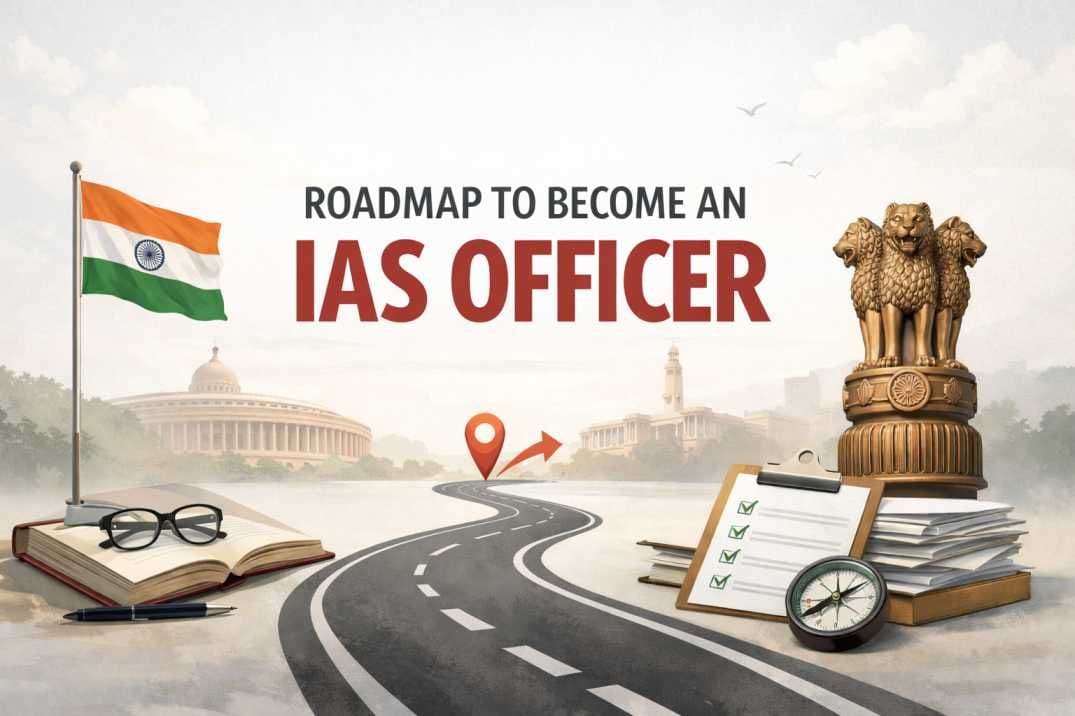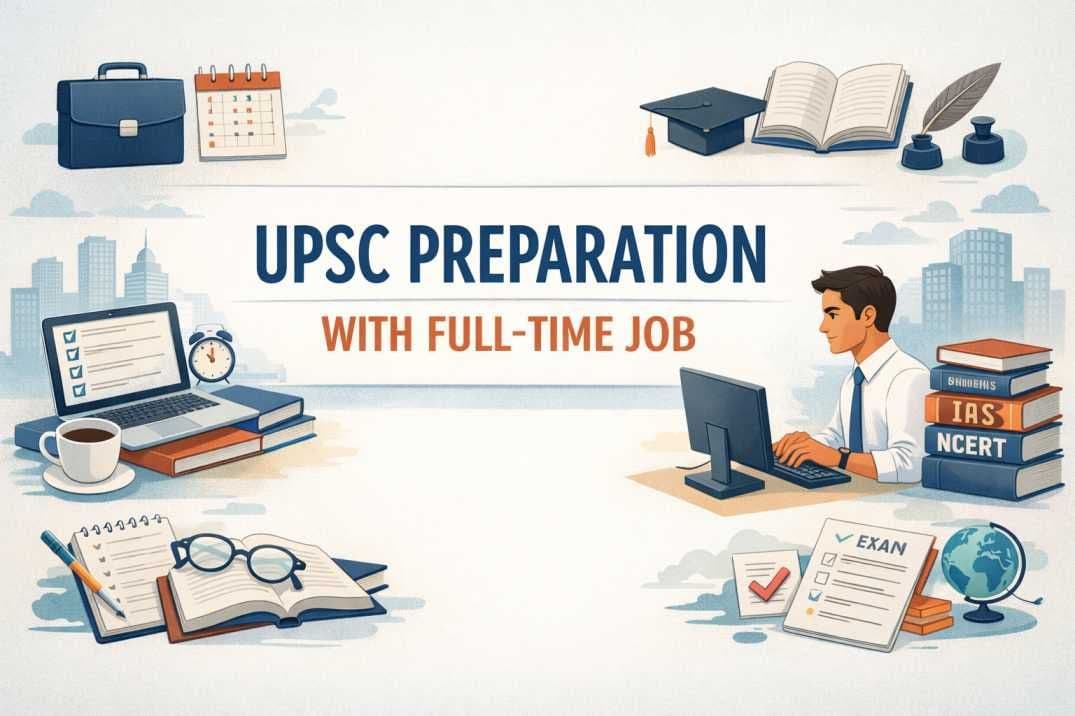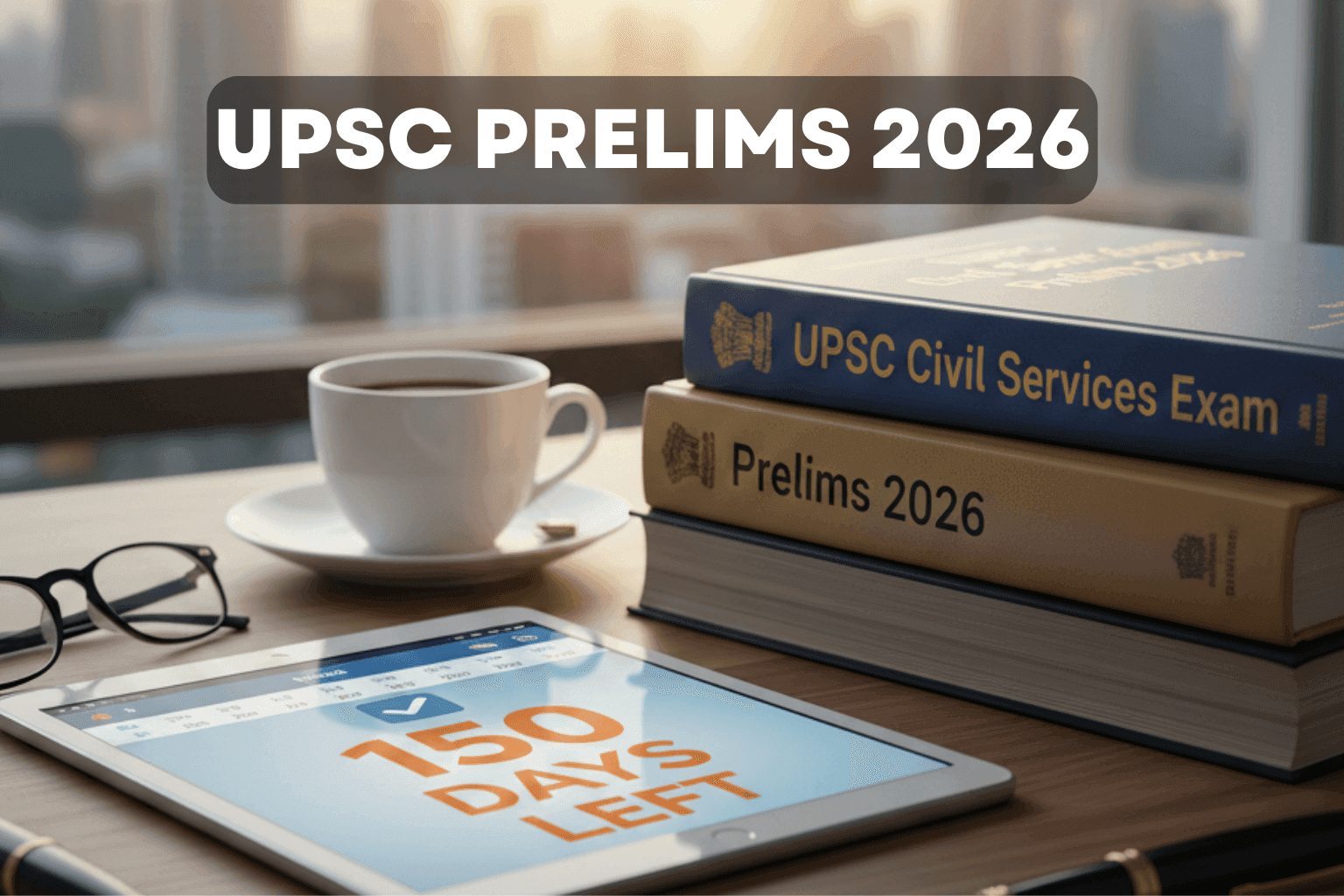Developing a Backup Plan for UPSC Civil Services Exam Preparation
Feb, 2025
•9 min read
It is advised to “hope for the best but prepare for the worst.” Every UPSC aspirant starts their journey with high hopes and unwavering determination. But have you ever thought about what you’d do if things didn’t unfold as you expected? What if the exam day doesn’t go as planned or the final list doesn’t have your name on it despite your best efforts? These are tough questions, but ignoring them won’t make them disappear.
Having a backup plan for UPSC aspirants isn’t about being pessimistic—it’s about being practical. The competition is intense, and not having a Plan B can leave you feeling stuck and uncertain.
What would you do if Plan A doesn’t work out? It’s time to think ahead and secure your future. Let’s explore how creating a backup plan can give you the freedom to pursue your IAS dream while staying prepared for life’s twists and turns.
The Importance of Having a Backup Plan for UPSC Aspirants
The journey to becoming a Civil Servant through the UPSC exam is undoubtedly challenging. Every aspirant dreams of cracking it on their first attempt. However, the reality is far from simple. While the dream of cracking the exam is shared by many, it’s crucial to acknowledge that success isn’t guaranteed for everyone. This is where the importance of having a backup plan for UPSC aspirants comes in.
Let’s explore why a backup plan is essential:
Limited Attempts and Age Limits
UPSC allows only a fixed number of attempts, and candidates must clear all stages within a specific age range. General category aspirants have only six attempts until the age of 32, while OBC candidates have nine attempts until 35. These restrictions mean that time is not always on your side.
High Competition with No Guaranteed Success
The odds are challenging, with over 10 lakh aspirants competing yearly for just a few hundred positions. Even after years of dedication, there’s no assurance of making it to the final list. Having a backup plan ensures that even if UPSC doesn’t work out, you have a solid alternative to fall back on.
Need for Alternative Career Paths
Many aspirants pursue postgraduate degrees, certifications, or professional courses alongside UPSC preparation. These qualifications open doors to alternative careers in teaching, journalism, research, or the private sector. Diversifying your skill set can provide more career options if UPSC doesn’t pan out.
Mental Peace and Reduced Stress
Preparing for UPSC can be incredibly stressful, especially when everything is riding on this one goal. Knowing you have something to fall back on, a solid backup plan can relieve some of that pressure. This allows you to prepare more precisely and with a more focused mind.
Financial Security
UPSC preparation requires years of focused effort, sometimes without a job. A backup plan, such as freelancing, part-time jobs, or parallel preparation for other government exams, can ensure financial stability while keeping you on track.
Maximizing Your Knowledge and Skills
The knowledge and skills you gain while preparing for UPSC can be applied to various other career paths. A backup plan allows you to leverage these skills and expertise in diverse fields, whether research, administration, policy-making, or entrepreneurship.
Ready to conquer the UPSC while balancing your job?
Join SuperKalam today for expert guidance, daily mock tests, and exclusive online study groups designed specifically for working professionals. Stay ahead with Tips for UPSC Preparation while Working Full-Time.
Alternative Government Exams for UPSC Aspirants

Given the stiff competition and the limited attempts for UPSC, exploring alternative government exams can be a smart way to expand your career options. Many of these exams offer prestigious positions with excellent growth opportunities and the chance to serve the nation in various capacities.
These exams provide an excellent backup plan and align well with the knowledge and skills developed during UPSC preparation. Let’s look at a comprehensive list of alternative government exams you should consider:
|
Bonus Tip: Set aside weekly time for a quick Art and Culture quiz on SuperKalam to test and strengthen your retention. |
|
Exam |
Conducting Body |
Job Roles Offered |
Eligibility |
Selection Process |
|
State Public Service Commissions (PSC) |
Respective State PSCs |
State Administrative, Police & Revenue Services |
Bachelor's Degree |
Prelims, Mains, Interview |
|
Staff Selection Commission (SSC) |
SSC (Government of India) |
Inspector, Auditor, Assistant in Ministries |
Bachelor's Degree |
Tier 1, Tier 2, Tier 3, Skill Test |
|
Railway Recruitment Board (RRB) |
Ministry of Railways |
Railway Officers, Engineers, Clerks |
12th or Graduation, depending on the role |
Written Exam & Skill Test |
|
Reserve Bank of India (RBI) |
RBI |
RBI Grade B Officers, Assistant |
Bachelor's Degree |
Phase 1, Phase 2, Interview |
|
Central Armed Police Forces (CAPF) |
UPSC |
Assistant Commandant, Other Leadership Roles |
Bachelor's Degree |
Written Exam, Physical Test, Interview |
|
Combined Defence Services (CDS) |
UPSC |
Officers in the Army, Navy, Air Force |
Bachelor's Degree |
Written Exam, SSB Interview |
|
Indian Forest Service (IFS) |
UPSC |
Forest Officers |
Bachelor's Degree in Science or Engineering |
Prelims (with UPSC), Mains, Interview |
|
National Bank for Agriculture and Rural Development (NABARD) |
NABARD |
Assistant Managers, Managers in the Agriculture Sector |
Bachelor's or Master’s Degree |
Prelims, Mains, Interview |
|
Intelligence Bureau (IB) |
Ministry of Home Affairs |
Intelligence Officers, Assistant Central Intelligence Officers |
Bachelor's Degree |
Tier 1, Tier 2, Interview |
Each exam offers a unique opportunity to work in different government sectors, whether administration, finance, defense, or law enforcement. Preparing for these exams often overlaps with UPSC subjects like general knowledge, current affairs, and aptitude, making them excellent alternatives for aspirants who have rigorously prepared for UPSC.
Also read: Tips to Clear UPSC Exam in First Attempt
Fellowships Programmes and Opportunities for UPSC Aspirants
UPSC preparation equips aspirants with a deep understanding of governance, policy-making, and social issues—valuable skills beyond the Civil Services. Even if you decide to explore other avenues, the knowledge, analytical skills, and dedication gained during UPSC preparation can open doors to meaningful careers and prestigious fellowship programs. These fellowships offer hands-on experience and allow you to work closely with communities, governments, and institutions, making a real-world impact.
Here’s a look at some of the most notable fellowship programs and opportunities for UPSC aspirants:
|
Fellowship |
Description |
Eligibility |
Duration |
Opportunities |
|
Teach For India |
A fellowship where fellows teach in under-resourced schools and work toward educational equity. |
Bachelor’s Degree |
2 years |
Teaching, Educational Leadership |
|
Young India Fellowship (YIF) |
A multidisciplinary fellowship offering leadership and liberal arts training for young professionals. |
Bachelor’s Degree |
1 year |
Leadership Roles, Social Impact Projects |
|
LAMP Fellowship |
Legislative Assistants to Members of Parliament; work closely with MPs on policy research and governance issues. |
Bachelor’s Degree Age Limit: 25 years |
1 Year |
Policy Research, Legislative Assistance |
|
Swaniti Fellowship |
Work on developmental projects with Members of Parliament and state governments to drive impact. |
Bachelor's Degree |
Varies |
Public Policy, Governance Projects |
|
Gandhi Fellowship |
A fellowship focused on grassroots leadership and working with schools and governments to improve the education system. |
Bachelor’s Degree |
2 years |
Leadership Development, Social Change |
|
Prime Minister’s Rural Development Fellowship (PMRDF) |
Work in underdeveloped areas of India to strengthen government projects and uplift communities. |
Master’s Degree |
2 years |
Rural Development, Public Administration |
|
Chief Minister’s Good Governance Associates (CMGGA) |
Fellows work with the Haryana Government to implement governance reforms and public policies. |
Bachelor’s Degree |
1 year |
Governance, Policy Implementation |
Governance, Policy Implementation
These fellowships allow you to contribute to society, gain real-world experience, and hone your leadership and problem-solving skills. Moreover, they are aligned with the principles of governance and service, which are central to UPSC preparation.
Joining such fellowship programs can provide a fulfilling alternative or complement your UPSC journey, keeping you engaged in nation-building and community service.
Also Read: 1 Year Plan for UPSC Preparation and Study
Opportunities in the Corporate Sector for UPSC Aspirants

There’s a common misconception that UPSC aspirants focused on government and policy work aren't equipped for the corporate world. However, the skills honed during UPSC preparation—analytical thinking, problem-solving, time management, and a solid grasp of current affairs—are highly valued in various industries.
Let’s explore the fields welcoming UPSC aspirants in the corporate sector:
Marketing and Communications
Marketing requires analyzing market trends, understanding consumer behavior, and developing effective communication strategies. UPSC aspirants, with their research skills and broad knowledge of societal trends, can excel in marketing roles such as brand strategists or marketing analysts.
Data Analysis and Consulting
The problem-solving and analytical skills developed through UPSC preparation align well with data analysis and consulting roles. Companies in finance, tech, and management consulting look for professionals who can analyze complex datasets and provide strategic insights—an area where aspirants shine.
EdTech and Education
Education plays a significant role in UPSC preparation, so aspirants are well-suited for careers in the growing EdTech industry. They can contribute as content creators, educators, curriculum designers, or subject matter experts. Many UPSC aspirants work as mentors or content developers for online learning platforms, helping others prepare for competitive exams.
Content Creation and Strategy
UPSC aspirants have strong writing skills and a deep understanding of various subjects. These attributes can be leveraged in content creation roles, such as developing educational content, writing policy analysis pieces, or even producing content for media outlets.
Corporate Social Responsibility (CSR) and Public Affairs
Companies have dedicated teams working on CSR initiatives, where they invest in community development, education, and environmental projects. The knowledge of public policies and governance gained during UPSC preparation makes aspirants ideal candidates for roles in CSR and public affairs departments. Many multinational corporations, like TATA and Reliance, hire professionals with a background in governance to lead their CSR efforts and ensure alignment with public policies.
Human Resources and Organizational Development
UPSC aspirants’ deep understanding of governance and policy frameworks can be valuable in HR roles, especially policy formulation. Their ability to manage people, mediate conflicts, and ensure compliance with regulations is well-suited for this sector.
These are just a few important examples of how UPSC aspirants can find meaningful and impactful careers in the corporate sector. So, if you’re considering a shift or a parallel career, don’t overlook the vast opportunities available in the corporate world.
Also worth reading: What UPSC Wants from IAS Aspirants
Opportunities for UPSC Aspirants in Teaching and NGOs
Two sectors that highly benefit from UPSC expertise are education and non-governmental organizations (NGOs). Both teaching and NGOs offer purpose-driven roles that are impactful and aligned with the values many UPSC aspirants hold dear—making a difference in society. These avenues allow aspirants to share their knowledge and continue their journey of contributing to the greater good.
Teaching Positions
One of the most natural transitions for UPSC aspirants is moving into teaching. The deep subject knowledge is a valuable resource, particularly for students aiming to follow the same path.
- Coaching Institutes: UPSC aspirants are highly sought after by coaching institutes, especially those offering Civil Services preparation. Former aspirants who have cleared the prelims or mains, even if they didn’t secure a final rank, join UPSC coaching institutes as faculty for GS (General Studies) or specific optional subjects.
- School and College Teaching: UPSC aspirants with a strong academic background can also pursue teaching positions in schools and colleges. Many private schools and educational institutions are keen on hiring individuals who have prepared for or appeared in UPSC.
- Online Education and EdTech: UPSC aspirants can leverage their expertise by creating video lectures, writing study materials, or conducting online classes. They can work as full-time educators or freelance content developers.
Want to join a thriving UPSC community? SuperKalam’s Telegram community is a vibrant space where you can connect with fellow aspirants, exchange study materials, discuss strategies, and stay motivated.
Purpose-Driven NGOs
Another fulfilling career option for UPSC aspirants is working with Non-Governmental Organizations (NGOs). These organizations work on various issues, such as education, health, environment, rural development, and women's empowerment.
- Policy Research Programs: Many NGOs focus on policy research and development, areas where UPSC aspirants’ understanding of governance, social structures, and public policy is crucial. NGOs like Pratham (education), SEWA (women’s empowerment), and Smile Foundation (child development) offer roles in policy implementation and community upliftment.
- Field Work and Project Implementation: Aspirants can also engage in on-the-ground work, managing and implementing projects to bring about tangible social change. NGOs like the Swaniti Initiative and Aga Khan Foundation collaborate with local and national governments.
- Program Management and Advocacy: NGOs need skilled individuals to manage large-scale programs, coordinate with government bodies, and advocate for social causes. NGOs involved in advocacy, such as Oxfam India or Greenpeace, seek professionals with a deep understanding of policy to influence government decisions, organize campaigns, or create impactful reports on pressing issues.
Working in NGOs allows UPSC aspirants to fulfill their desire to serve society, even if their path doesn’t lead to government service. Whether in teaching or NGOs, UPSC aspirants are well-positioned to take on impactful roles that align with their skills and aspirations.
Also watch: The Inspiring Story of Aspirants | Aspirants Anthem | SuperKalam
Conclusion
Success should not be confined to just cracking the UPSC exam. It’s about growth, learning, and building resilience throughout your preparation. The skills you’ve honed—critical thinking, discipline, and problem-solving—equip you for many paths far beyond government service. Embrace that your hard work has already brought you closer to becoming a better, more capable version of yourself.
Each step, whether towards the exam or an alternate career, brings its rewards. Be flexible, be curious, and trust that the right opportunity will align with your values and aspirations.
Ultimately, what matters is not just the destination but the journey itself. The opportunities are endless, and your preparation has equipped you for greatness in your chosen path.
Stay motivated, and never stop learning!
Are you ready to take your preparation to the next level? SuperKalam is here to help you every step of the way, offering resources that align perfectly with your needs.
Explore our online courses, test your skills with mock exams, and join our dynamic study community today. Transform your study sessions and achieve your goals with confidence!
Keep pushing forward, stay disciplined, and let SuperKalam be your guide in this journey.
Also read: Useful Websites For UPSC And IAS Preparation


